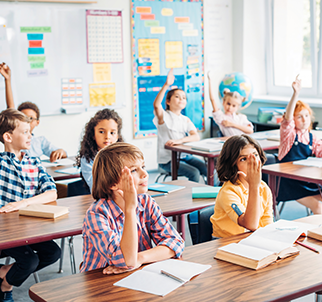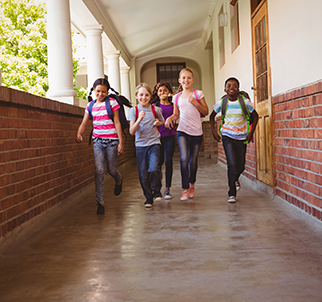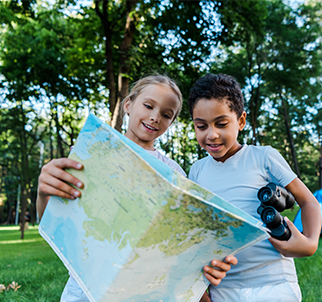Our students and our classes (online)

Children from different countries present the life of a typical class of their school at the level of a weekly timetable, teaching, material to provision, extracurricular activities, holidays. This presentation in the form of a slide show with videos is followed by a sequence of questions and answers.
As part of learning English, it will be necessary for the question-answer sequence to be done in two stages so that the students at the beginning learning English can prepare answers with teachers. This preparation can be done before the visit or during the stay!
The children will produce identity cards which will be present on eTwinning. These sheets will present “typical children” from school. It will also be possible to have records of real children. This card-based approach should enable children from other schools to understand the differences and
similarities … the idea would be not to use the same cards for all schools. The layout of the cards would already give interesting indications on what may or may not appear important depending on the country. It would be possible, in a second step, to supplement the sheets by possible requests of the other participants.
C1 - our village (spain)

The content will be based on the presentation of schools and villages using both graphic representations (use of Excel or the Open workbook Office) for statistical data and photo or video reports for life in schools and in towns or villages.
The activities are completely in line with the program and the use of multimedia in our schools.
The graphic representations and the approach to the life of our communities are also clearly present in the official school curricula.
Observing the functioning of schools in the management of school time but also in the management of extracurricular time can provide us with better knowledge of others, for example at the level of the priorities given by the various systems involved.
The approach of English, more particularly, can also allow us an exchange of good practices that it would be possible to live in parallel in the different schools throughout this project. The setting up of exchanges in various forms should be able to be launched during this transnational meeting.
C2 - geography of Our country (guadeloupe)

Unlike the activity on the children’s cards, the first step in this approach will be to construct a blank identity card. This approach will put forward the communication channels between the different partners. We will be able to work with eTwinning in the context of forums but also in the framework of virtual meetings. We will add to this another videoconferencing channel (Messenger, Facetime, Skype, Teams, …) which will be determined by the different partners depending on affinities. This channel should be usable by the various stakeholders and we should not fall into the multiplication of communication channels so as not to go in all directions and therefore lose control.
Once this sheet has been built in partnership, the different schools will glean the information to complete it.
During the meeting itself, the sheets will be presented and, then, will be published in several media: poster, booklet, etc.
The supports must take place in schools in the area reserved specifically for the project.
C3 - Our customs, culture, architecture and art
(Croatia)

This activity will allow us to compare our partner countries but also other countries based on the one hand on the sheets produced during activity C3 but also on the basis of other needs that would have arisen during the evaluation of the previous meeting.
It is for example at this moment of our project that we will be able to approach culture in the broad sense of the word, that is to say music, painting, architecture, folklore, …
In terms of ICT, we will produce a book that will include both information from the first stages of our project and more specific information from this activity C4. The tools used will be the word processing with the highlighting of the functionalities of this tool not often taught, namely the standardized titles, automatic tables of contents, numbering, insertions of documents in different formats, etc. Students will receive a training which will allow them to present their productions very correctly. This aspect is often overlooked and will allow all children to be put on the same footing. We believe that this point clearly falls within social inclusion.
At the level of the different schools, an in-depth reflection will be made on the importance of the continuity of ICT learning. The current containment has put en vent a real social divide at this level. It will, moreover, perhaps be possible that, within the framework of this project, we set up training with certain parents …
C5 - Europe: its history yesterday and today
(Belgium)

Europe in the sense of the institution.
This last stage of our project should show us the importance of the European Community institution in many aspects.
What path did each partner follow before entering the institution (brief history) and what does Europe imply today in the daily life of each of us…
During this activity we will travel to Brussels.
We will visit the Parlamentarium exhibition and we will walk through the European district of the capital. This visit allows an extraordinary multimedia approach that corresponds perfectly to our project. This will be an opportunity to produce a report that can be offered in our respective schools. This report will be broadcast on a support stamped Erasmus.
Moments will be organized in the school to meet the new technologies used in the school.
Each partner will present their work on the timeline of Europe from 1945 to the present day.
